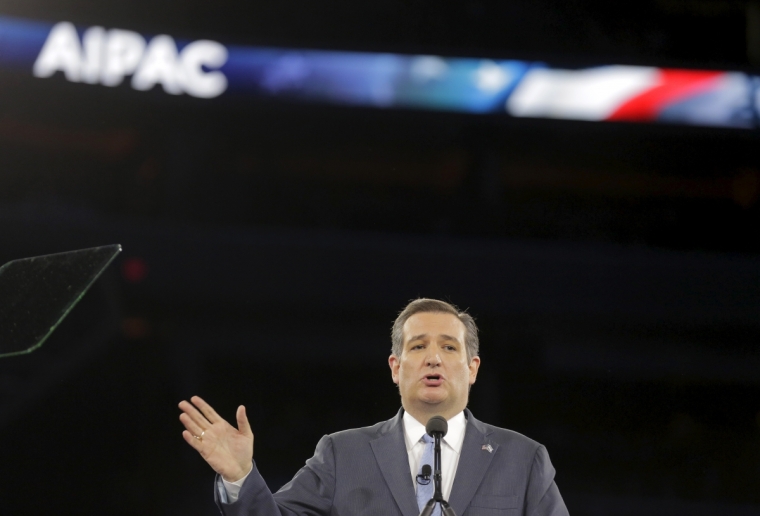Trump flips on 'taking sides' with Israel; Cruz points out Trump's use of term 'Palestine'

WASHINGTON (Christian Examiner) – Less than one month after refusing to say what side he would take in future negotiations between Palestinians and Israelis, presidential front runner Donald Trump has changed course.
During his address to the American-Israel Public Affairs Committee (AIPAC) March 21, Trump told attendees he had not come to the gathering to pander to it. Instead, he took a hardline stance that could only be taken as an endorsement of the Israeli position in those decades-long negotiations – including recognizing Jerusalem as the "eternal Jewish capital."
"I came here to speak to you about where I stand on the future of American relations with our strategic ally, our unbreakable friendship, and our cultural brother, the only democracy in the Middle East, the State of Israel," Trump said.
However, several times during the event, Trump hinted that he already saw "Palestine" as a legitimate state, referring to the Palestinian Authority (PA) and some territories under Israeli control by the name.
Republican challenger Texas Sen. Ted Cruz pounced on the gaff.
"Let me just say at the outset," Cruz said, "Perhaps to the surprise of the previous speaker, Palestine has not existed since 1948."
In 2017 we will have a commander-in-chief who will say to Iran, 'Either you shut down your nuclear program, or we will shut it down for you. ... Weakness is provocative. Appeasement increases the chance for conflict.
Cruz also reminded the crowd during his address that Trump had pledged on multiple occasions to be neutral in the negotiations between Israel and the PA.
"Let me be very, very clear: As president, I will not be neutral," Cruz said.
Trump said his main goal, if elected president, would be to dismantle the nuclear deal reached between the United States, its European allies and Iran. The candidate called the deal a win only for Iran and a catastrophic loss for the America, Israel and the remainder of the Middle East. He said he could achieve a better "deal."
"The problem here is fundamental. We have rewarded the world's leading state sponsor of terror with $150 billion and we received absolutely nothing in return," Trump said. He added that the deal eventually allows Iran to obtain nuclear weapons, especially after the monitoring of Iran's nuclear program ends.
Some of Iran's efforts, he said, include Iran's funding and arming of Hezbollah, the Shiite jihadist and political organization in Lebanon. Trump said the group had "received sophisticated anti-ship weapons, anti-aircraft weapons, and GPS systems on rockets. Now they're in Syria trying to establish another front against Israel from the Syrian side of the Golan Heights.
Trump said Iran's recent missile tests illustrate the impotence of the United Nations and shows that the organization, even though its headquarters are in the United States, is no friend to America. In fact, Trump said, the UN is "not a friend of democracy. It's not a friend to freedom."
He also said the UN would never make a deal that did not benefit Israel. Deals, he said, are made by negotiators, rather than imposed by a third party. If the UN imposes a peace deal, it would be rewarding Palestinian terrorism.
"It's not up the United Nations to impose a solution. The parties must negotiate a resolution themselves. The United States can be useful as a facilitator of negotiations, but no one should be telling Israel it must abide by some agreement made by others thousands of miles away that don't even really know what's happening," Trump said.
During his address, Cruz reiterated his positions on Israel, including his promise to tear up the Iran nuclear deal on his first day in office. He likened the deal to "Munich in 1938" – the last chance the world had to stop Adolf Hitler before the Nazi war machine launched its Blitzkrieg.
"I recognize for years a whole lot of presidential candidates, both Republicans and Democrats, have said that. Indeed, I recognize some candidates have said that standing here today. Here's the difference: I will do it," Cruz said.
"In 2017 we will have a commander-in-chief who will say to Iran, 'Either you shut down your nuclear program, or we will shut it down for you," Cruz said. "Weakness is provocative. Appeasement increases the chance for conflict."
Cruz also said he would oppose the growing boycott, divest and sanction (BDS) movement against Israel that has gained momentum in left-leaning circles, and even among some church groups such as the Presbyterian Church in the USA. He said he would prohibit federal funding to universities and organizations that adopt the policy.
Cruz said the barrier to peace in between Israel and its neighbors is not Israel. "It is the Palestinian Authority in a unity government with Hamas that celebrates the murder or innocent women and children and even incites and compensates for the terrorist attacks."
Should the UN attempt to push through a unilateral recognition of Palestinian statehood, Cruz said the U.S. would veto the move – and, if president, he said he would fly to New York to cast the vote.